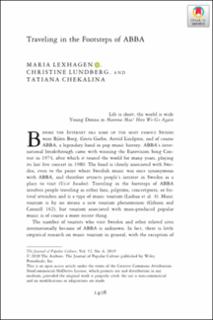Traveling in the Footsteps of ABBA
Peer reviewed, Journal article
Published version
Permanent lenke
https://hdl.handle.net/11250/2654506Utgivelsesdato
2019-01Metadata
Vis full innførselSamlinger
Originalversjon
Lexhagen, M., Lundberg, C., Chekalina, T. (2020) Traveling in the Footsteps of ABBA. Journal of Popular Culture, 52 (6), 1408-1432. 10.1111/jpcu.12859Sammendrag
Before the Internet era some of the most famous Swedes were Björn Borg, Greta Garbo, Astrid Lindgren, and of course ABBA, a legendary band in pop music history. ABBA's international breakthrough came with winning the Eurovision Song Contest in 1974, after which it toured the world for many years, playing its last live concert in 1980. The band is closely associated with Sweden, even to the point where Swedish music was once synonymous with ABBA, and therefore attracts people's interest in Sweden as a place to visit (Visit Sweden). Traveling in the footsteps of ABBA involves people traveling as either fans, pilgrims, concertgoers, or festival attendees and is a type of music tourism (Lashua et al. 4). Music tourism is by no means a new tourism phenomenon (Gibson and Connell 162), but tourism associated with mass‐produced popular music is of course a more recent thing.
The number of tourists who visit Sweden and other related sites internationally because of ABBA is unknown. In fact, there is little empirical research on music tourism in general, with the exception of a few specific case studies on the Beatles and Liverpool (Cohen), the Korean pop wave (Kim and Nam), and the Eurovision Song Contest (Linden and Linden). Qualitative research on music tourism is also scant. One exception is a study by Leonieke Bolderman and Stijn Reijnders about fans of ABBA, U2, and Wagner, in which they found that ABBA fans travelled as a way of sharing identities across generations.

